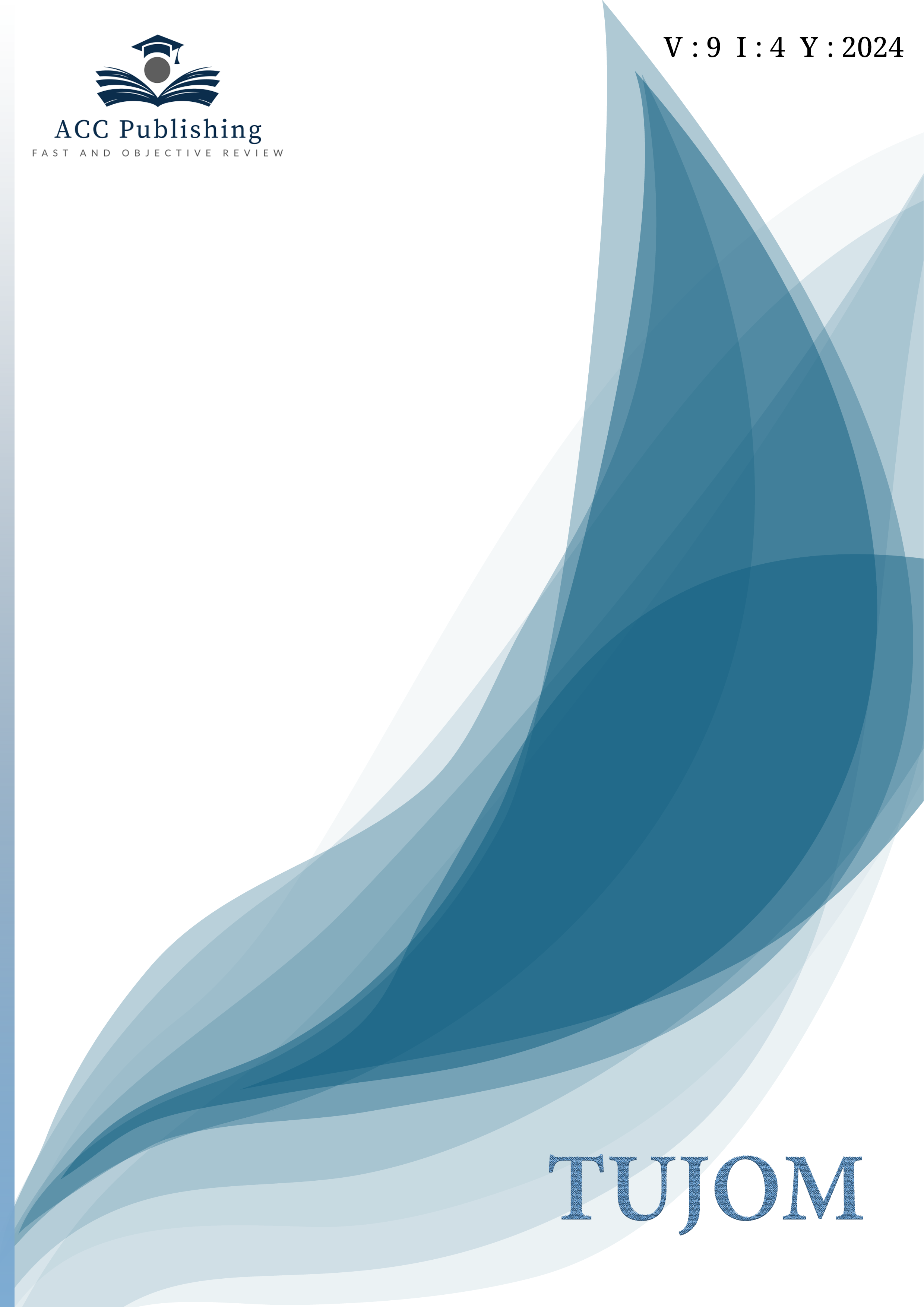Determining the attitude towards phygital marketing technologies by using the technology acceptance model in terms of tourism businesses
Published 12/25/2024
Keywords
- Tourism, Phygital, Phygital Transformation, Phygital Marketing, Hotels
Copyright (c) 2024 Kenan Güllü- Didem Aşar- Hatice Tüfek

This work is licensed under a Creative Commons Attribution-NonCommercial-NoDerivatives 4.0 International License.
How to Cite
Abstract
Today, in addition to traditional marketing practices, digital platforms have become increasingly compelling, and new technological marketing methods have been adopted. One of these new marketing methods is digital marketing. This study examines the perceptions of accommodation establishments, one of the important components of the tourism sector's phygital marketing. The study data were obtained from a survey application including five-star hotels serving in the provinces that host the most tourists in Turkey in 2023 (Istanbul, Aydın, İzmir, Muğla and Antalya). Parametric tests were performed on the data obtained. In the study, ANOVA analysis was performed to determine the differences between the phygital marketing practices and the activity periods of the enterprises. According to the analysis results, it was concluded that there was no significant difference between the perceptions of phygital marketing applications and business activity periods. Correlation analysis results showed that perceived usefulness, ease of use, trust, and innovativeness in phygital marketing applications are related to behavioural intention. The regression analysis results determined whether the perceptions formed in phygital marketing applications in businesses significantly affect behavioural intention and showed that perceived usefulness, ease of use, trust, and innovativeness in phygital marketing applications significantly affect behavioural intention.
References
- Altunışık, R., Coşkun, R., Bayraktaroğlu, S. ve Yıldırım, E. (2015), Sosyal Bilimlerde Araştırma Yöntemleri, Adapazarı: Sakarya Yayıncılık.
- Ballina, F. J., Valdes, L., & Del Valle, E. (2019), "The Phygital experience in the smart tourism destination", International Journal of Tourism Cities, 5, 656-671.
- Bec, A., Moyle, B., Timms, K., Schaffer, V., Skavronskaya, L. ve Little, C. (2019), "Management of immersive heritage tourism experiencs: a conceptual model", Tourism Management, 72, 117–120.
- Bilici, F. (2015), “Pazarlamada Artırılmış Gerçeklik ve Karekod Teknolojileri: Tüketicilerin Artırılmış Gerçeklik Teknoloji Algılamaları Üzerine Bir Alan Araştırması”, Yayımlanmış Yüksek Lisans Tezi, Bursa: Uludağ Üniversitesi Sosyal Bilimler Enstitüsü.
- Bostan, B. (2007), T.C. Marmara üniversitesi sosyal bilimler enstitüsü sanal gerçeklikte etkileşim. Doktora Tezi, İstanbul.
- Buhalis, D., & Law, R. (2008), "Progress in information technology and tourism management: 20 years on and 10 years after the Internet: The state of eTourism research", Tourism Management, 29, 609–623.
- Chastel, A., Grondin, S. ve Baland, J. (2019). Phygital Boom May Lead To Luxury Implosion, Global Fashion Management Conference at Paris, 1-4.
- Chiao, H. M., Chen, Y. L. ve Huang, W. H. (2018), "Examining the usability of an online virtual tour-guiding platform for cultural tourism education", Journal of Hospitality, Leisure, Sport & Tourism Education, 23, 29–38.
- Çelik, S. (2021), Dijital Pazarlamanın Yeni Yüzü: Fijital Pazarlama.
- De La Flor, C. (2020). What's Phygital in the Customer Experience?
- Demirezen, B. (2019), “Artırılmış gerçeklik ve sanal gerçeklik teknolojisinin turizm sektöründe kullanılabilirliği üzerine bir literatür taraması”, Uluslararası Global Turizm Araştırmaları Dergisi, 3, 1-26.
- Güllü, K., Acar, N. (2023), “Pazarlama Yönetiminde E-Teknolojik Trendler içinde: Arttırılmış Gerçeklik”, Ankara: Nobel Yayıncılık.
- Gretzel, U., Sigala, M., Xiang, Z., & Koo, C. (2015), "Smart tourism: foundations and developments", Electronic Markets, 25, 179–188.
- Guttentag, D. A. (2010), "Virtual reality: Applications and implications for tourism", Tourism Management, 31, 637-651.
- Horster, E. (2015), “Die customer journey im digitalen tourismusmarketing. ın a. schulz, u. weithöner, r. egger, & goecke, r. (eds.), etourismus: prozesse und systeme”, Informations management in Tourismus, 94–116.
- Jenny, S. (2017), Enhancing Tourism with Augmented and Virtual Reality, ,(Published Bachelor's Thesis)", Degree Programme in Business Information Technology Häme University of Applied Sciences.
- Koç, R. E., “Destinasyon pazarlamasında arttırılmış ve sanal gerçekliğin kullanımı: fijital turizm”.
- Köse. N. (2017), “Artırılmış gerçeklik uygulamalarının reklam kampanyalarına etkisi”, Yeni Medya Elektronik Dergisi, 1, 53-59.
- Köse, N., & Yengı̇n, D. (2018). Dijital pazarlamadan fijital pazarlamaya geçişe örnek olarak artırılmış gerçeklik ve sanal gerçeklik uygulamalarının pazarlama üzerindeki katkılarının incelenmesi. İstanbul Aydın Üniversitesi Dergisi, 10(1), 77-111.
- Neuburger, L., Beck, J., & Egger, R. (2018), "The 'Phygital'tourist experience: The use of augmented and virtual reality in destination marketing", In Tourism planning and destination marketing, 183-202.
- Odabaşı, Y. (2017), “Pazarlama Fijital Dünyanın Neresinde?”, Brandmap Dergisi.
- Sağtaş, S. (2023), “Dijital Pazarlamanın Değişen Yüzü: Fijital Pazarlama Ve Uygulamaları Üzerine Bir Araştırma”, Socıal Scıences Studıes Journal (Sssjournal), 8, 629-637.
- Sherman, A. (2011), "How tech is changing the museum experience", Mashable. Retrieved July, 23, 2015.
- T.C. Kültür ve Turizm Bakanlığı. https://yigm.ktb.gov.tr/genel/turizmtesisleri.aspx
- Yalçınkaya, N. G. (2017), “Fijital (Phygital) Dünya”, Brandmap Dergisi.



